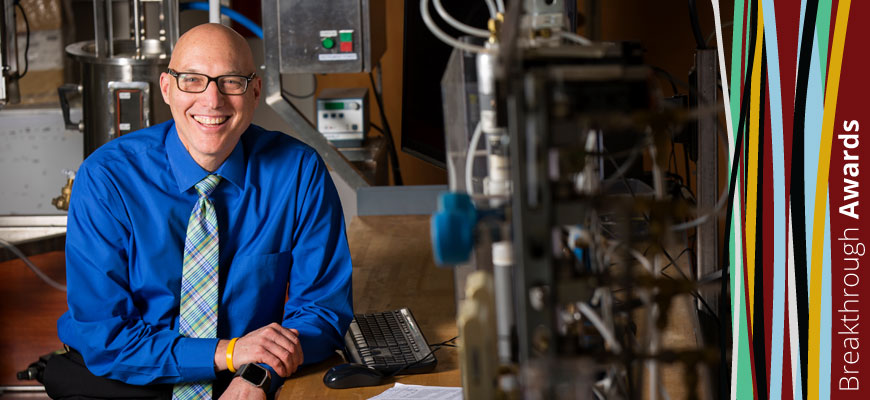
Powering the future
Chemical engineering researcher John Weidner is looking to improve renewable energy
Posted on: May 29, 2017; Updated on: May 29, 2017
By Melinda Waldrop, melwal@mailbox.sc.edu, 803-777-3685
John Weidner can see the future. Incrementally, he’s also changing it.
Weidner, a professor of chemical engineering who’s been at USC since 1991, concentrates his research in electrochemistry. What he’s really after is the hydrogen made by adding electricity to water — specifically, the renewable kind.
“You can’t dig up hydrogen like you can petroleum, so you have to make it,” Weidner says. “We’re looking for ways of making hydrogen that don’t contain carbon.”
You can’t dig up hydrogen like you can petroleum, so you have to make it. We’re looking for ways of making hydrogen that don’t contain carbon.
John Weidner
Weidner, chair of the Department of Chemical Engineering, is also the director of the university’s Center for Hydrogen and Fuel Cells. The center tackles the challenges of culling hydrogen from electricity generated by wind turbines or the sun, storing the energy gleaned from those intermittent sources and making the process scalable enough to be affordable and long-lasting.
“Cost is one thing, and then the other thing is durability,” Weidner says. “When you run your electric vehicle on hydrogen, you also want to make sure that your car is going to last for 150,000 miles. A lot of times, if you drop the cost, you sacrifice durability, and so you’re always trying to find that balance.”
That’s where mathematical modeling comes in. Several of the numerous Ph.D. students whose research Weidner has directed work for companies that make expensive, critical devices, such as pacemaker batteries. Such products require proven, predictable results to be marketable.
“You can’t wait 10 years to know whether you made a good product,” Weidner says. “A big part of what my group does and the center does is develop these models to predict performance — can we replicate in six months what will happen in 10 years?”
Weidner’s contributions are numerous and far-reaching. Since becoming department chair in 2011, he has hired five tenure-track faculty and achieved record research productivity for the department while more than doubling the number of undergraduates enrolled in both chemical and biomedical engineering. Recently, he established an affiliate membership with a research center at Ohio University as well as internship programs at General Motors and the National Renewable Energy Laboratory. He also signed memoranda of understanding with universities in Korea and Thailand to provide students with international renewable energy research opportunities.
Weidner, who received the Energy Summit Education Leader Award from the Charlotte Business Journal in 2016, has witnessed significant progress in electrochemistry during his 25 years at Carolina. Currently, his department — and the field of chemical engineering — is exploring process intensification, or the dramatic simplification of process technologies. Weidner expects the energy and cost savings produced by this approach will revolutionize chemical manufacturing, and he says electrochemistry will power that revolution.
“A lot of times, people ask, ‘Are there any more breakthroughs in fuel cells and batteries?’ ” he says. “It’s usually not a breakthrough in the sense of, ‘OK, now it’s ready.’
“You’re slowly dropping the cost. You’re improving the durability. It doesn’t seem like you’re making any progress until you look back and say, ‘Boy, 10 years ago, this was three times more expensive and it only lasted half as long.’ It’s hard to point to that one thing, but it’s the small improvements that everyone makes.”